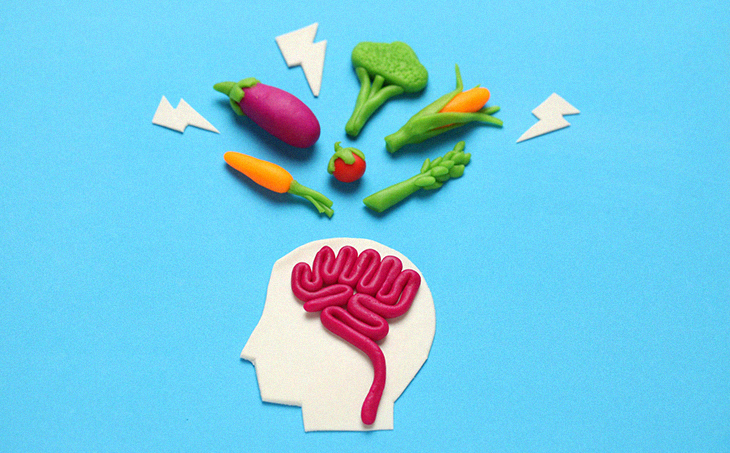
The way we eat, and what we munch on impacts our health in many ways. These would include our weight, athletic performance, and the risk of chronic diseases, like diabetes and heart disease. No wonder there are a lot of diets around, like the low-carb diet, paleo diet, keto diet, and vegan diet to mention a few. New research suggests that our diet may affect mental health as well.
The most common mental health conditions are anxiety and depression. The World Health Organization (WHO) says that depression could be one of the top health concerns in the world by 2030.
Researchers continue to search for new ways to reduce problems with mental health, instead of just relying on current therapies and medications. A new area of research is nutritional psychiatry, which looks at the role of nutrition in the development and treatment of mental health problems. Specifically, “Does diet help prevent mental conditions?” and, “Are nutrition interventions helpful in the treatment of these conditions?”
Studies on diet and mental health
Several observational studies have shown a link between diet quality and the risk of depression. One review of 21 studies from 10 countries discovered that a healthful dietary pattern, characterized by high intakes of vegetables, fruit, fish, olive oil, whole grains, low fat dairy, and antioxidants; as well as low intake of animal foods – was associated with a low risk of depression.
On the other hand, a Western-style diet, involving a high intake of red and processed meats, sweets, butter, potatoes, refined grains, and high fat dairy products; and low consumption of fruits and vegetables, was linked with a high risk of depression.
It was also found out that a high compliance with a Mediterranean diet was associated with a 32% reduced risk of depression.
Recently, a study considering adults over 50 found a link between higher levels of anxiety and diets high in saturated fat and added sugars. It is also interesting that similar findings were noted in kids and teens. A 2019 review of 56 studies found a link between high intake of fish, nuts, fruits, vegetables, dairy products, and olive oil, and a reduced risk of depression during adolescence.
Yet, keep in mind that observational studies can show an association, it cannot prove cause and effect. Similarly, random controlled trials have several limitations when it comes to nutrition research studies, including difficulties with accurately measuring food intake. Researchers often rely on participants recalling what they have eaten, the past days, weeks, or months…but obviously their memory is not completely reliable.
Treatment
Note that the research on whether dietary interventions can help treat mental health problems is new and quite limited. That being said, the SMILES trial was one of the first randomized controlled trials to study the role of diet in the treatment of depression.
Over a span of 12 weeks, 67 individuals with moderate to severe depression received either dietary counselling or social support, aside from their current treatment. The dietary intervention was similar to the Mediterranean diet, with emphasis on fruits, vegetables, fish, extra virgin olive oil, raw nuts, legumes, and whole grains. It also allowed at times, moderate amounts of red meat and dairy.
At the end of the study, the diet group had significant improvements in depression symptoms. The improvements were still significant even with some variables like physical activity, Body Mass Index, and smoking.
The control group only 8% of the individuals achieved remission, while the diet group had 32%. As promising as the results are, the SMILES study was a small and short-term study. Larger and longer term studies are needed to apply its findings to a larger population. Replicating the findings is essential, as not all research agrees with them. For example, a study that recruited 1,025 adults that were overweight or obese, and with mild depressive symptoms, researchers found no significant difference in depressive episodes between the control group and the diet group.
So, it is difficult to draw conclusions from existing research, particularly to the type of dietary intervention. More research is needed on the topic of specific dietary patterns and the treatment of mental health conditions. A more standardized definition of a healthful diet is needed, as well as larger and longer-term studies.
Scientists are also interested in the potential effects that individual nutrients in the form of dietary supplements might have on mental health. They have found links between low levels of certain nutrients, such as iron, magnesium, folate, zinc, vitamins B6,B12, and D – and feelings of anxiety, worsening moods, and risk of depression. But, there is no evidence that consuming extra amounts of these nutrients will benefit mental health.
Seems confusing actually. Take for example a person deficient in magnesium, taking magnesium supplements may help improve symptoms. However, if an individual is getting adequate amounts of magnesium in their diet, it is unclear whether taking supplements will provide any benefits.
Similarly, omega-3 fatty acids are essential fats that play an important role in brain development and cell signaling. They reduce levels of inflammation aside from their importance in brain health, scientists have investigated omega-3 for their potential effects on mental health. However, as with mineral supplements and vitamins, it still is unclear if omega-3 supplementation can improve moods in most individuals, or is primarily effective with those with low intake of omega-3.
More research is needed, but randomized controlled trials in 2018 and 2019 found that omega-3 supplements were effective in the treatment of anxiety and depression in adults. There is still a lot we don’t know about taking supplements and mental health, like what are the optimal doses, and long-term safety and effectiveness. So experts recommend getting a balanced diet with all the nutrients you need. And always consult your doctor or dietician.
So the question is “Why?”
Given that more research is needed,overall, studies suggest that there is a link between what people eat and their mental health. However, it is still not clear why nutrition may have this effect.
There are several theories though, on how diet may influence mood, and the risk of anxiety and depression. Some scientists believe that the inflammatory effects of certain diets may help explain the relationship between mental health and the diet. Several mental health conditions seem to have links with increased levels of inflammation. For instance, diets associated with benefits for mental health tend to be high in vegetables, fruits, healthful fats, and whole grains – all of which are rich in anti-inflammatory compounds. A review of observational studies supports this theory – diets high in antioxidants and anti-inflammatory foods were associated with a reduced risk of depression. Yet, the exact relationship between diet, inflammation, and changes in mental health is not completely understood.
Another theory is that diet may affect the bacteria in the gut, or the gut microbiome. Ongoing research discovered a strong link between gut health and brain function. Healthy bacteria in the gut produce about 90% of the neurotransmitter serotonin, which affects mood. Furthermore, a healthy gut microbiome is linked to lower rates of depression. This theory is a promising explanation of how our diet affects our mental health.
Lastly, there is the possibility that diet plays a more indirect role in mental health. It may be that people with healthful diets are more likely to engage in behaviors that reduce the risk of mental health conditions, such as regular exercise, good sleeping habits, and not smoking.
Mental health is complex
Note that there are many factors that can influence eating habits and mental health. Biological factors like genetics, family history, and life experiences. Socioeconomic status likewise can affect mental health, as well as access to food and overall diet quality.
In turn, mental health can affect eating habits.for instance, when a person gets angry or upset, that person is more likely to turn to less healthy foods like sweets and processed snack foods. In the same manner, many antidepressants can increase appetite and cravings. These situations can make it difficult to maintain a healthful diet.
The study on how nutrition affects our mental health is still ongoing. Even as more research is needed, a healthful diet seems to help mental health. At the least, it makes you feel good about yourself. But the proper diet is just part of the complex topic of mental health. So for those who feel they have symptoms of depression, consult your doctor. And remember, you are what you eat.



